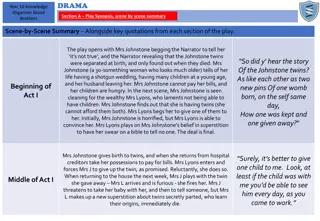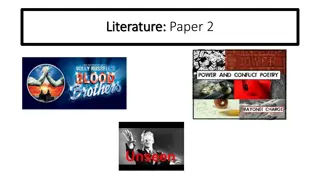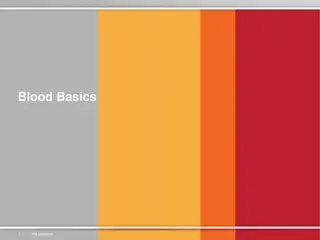The Role of the Narrator in Blood Brothers
The concept of the narrator in storytelling can be traced back to the Greek chorus in ancient Greek theater. In Blood Brothers, the narrator plays a significant role in guiding the audience through the story, providing commentary, and influencing the narrative's progression. Understanding the different types of narrators, such as first-person, second-person, and third-person omniscient or limited, can enhance the reader's experience of the text.
Download Presentation

Please find below an Image/Link to download the presentation.
The content on the website is provided AS IS for your information and personal use only. It may not be sold, licensed, or shared on other websites without obtaining consent from the author.If you encounter any issues during the download, it is possible that the publisher has removed the file from their server.
You are allowed to download the files provided on this website for personal or commercial use, subject to the condition that they are used lawfully. All files are the property of their respective owners.
The content on the website is provided AS IS for your information and personal use only. It may not be sold, licensed, or shared on other websites without obtaining consent from the author.
E N D
Presentation Transcript
Date: 19th October 2021 Title: What is the role of the narrator? Recap questions: 1. What is the difference between a proper noun and a common noun? 2. What does the word didactic mean? 3. What is the definition of a tragicomedy? 4.What is the purpose of a prologue? 5.What is the difference between a symbol and a motif? Do it now Do it now Miss Odell is currently reading
New knowledge / Pen to PaperWhat is a narrator? in-writing-definitions-and-examples#3-types-of-point-of-view What type of narrator do you think the narrator is in Blood Brothers? New knowledge / Pen to Paper A narrator is the person who tells the story . There are three main types of narrative voice: 1. First person one of the characters is narrating the story and uses the first person pronoun I . 2. Second Person structured around the you pronoun but is very rare in novel- length work. 3. Third person the narrator is telling the story about the characters and refers to them using the third person pronouns he / she a. Third person omniscient the omniscient narrator knows everything about the story and its characters. They can enter anyone s mind, move freely through time and give the reader their own opinions and observations as well as those of the characters. This narrator also knows more than the characters god s-eye- view. b. Third person limited the third person limited narrator sticks closely to one character but remains in third person. They can see inside one character s head their thoughts, feelings and sensations. Talk partners https://www.masterclass.com/articles/complete-guide-to-point-of-view-
The concept of the narrator stems from the Greek chorus New knowledge New knowledge
The concept of the narrator stems from the Greek chorus A Greek Chorus is a theatrical device originating in ancient Greek theatre involving a small group of performers who are usually unrelated to the central action of a story commenting on the central action of a play. The chorus speaks directly to the audience and may not interact with the main characters of a story at all. Their purpose is to underscore the moral themes, actions, character development, and messages of a story to the audience. The Greek chorus was prevalent in classical Greek drama of the 5th century BCE. Classical tragedy originated in Ancient Greek theatre, with the chorus acting as a guiding voice to the audience, cluing them in on shifts in the plot or a character s inner state. The chorus also would typically pronounce judgment on the fate of the characters in the drama, heightening the tragic elements of the play. New knowledge New knowledge https://www.masterclass.com/articles/greek-chorus-guide#what-is-a-greek-chorus
The function of the Greek chorus Provides commentary on the action of a play: Chorus members commenting on the themes, messages, and unseen action of a play helped to guide audiences to understand the intended progression of a narrative. Ancient Greek theater typically involved one actor playing many different roles, and the Greek chorus helped to clarify what was going on. Draws the audience in: The Greek chorus addresses the audience directly, often engaging in wry commentary seeking to let the audience in on privileged information. Expresses a characters inner thoughts: The Greek chorus is able to reveal a main character s emotions and motivations to the audience, even when they are trying to hide them. Gives principal actors a moment offstage: Choral interludes allowed actors in ancient Greece a moment to change backstage, often with actors playing multiple characters needing a breather. https://www.masterclass.com/articles/greek-chorus-guide#what-is-a-greek-chorus New knowledge / Pen to paper New knowledge / Pen to paper Talk partners To what extent does the narrator from Blood Brothers fulfil the above roles?
The function of the narrator in Blood Brothers a textual exploration Provides commentary on the action of a play? Draws the audience in? Expresses a characters inner thoughts?. Gives principal actors a moment offstage? Something else? Pen to paper Pen to paper
But who is the narrator in Blood Brothers? The Narrator represents the Devil, because he is always right behind the characters, an unseen part of their lives. The Narrator acts as the conscience; of the characters in the play and the audience. The Narrator in Blood Brothers represents the public, who are often judgemental and critical when they hear the headline news, before they know all the facts. The Narrator represents Willy Russell. Reflection Reflection What do you think?























